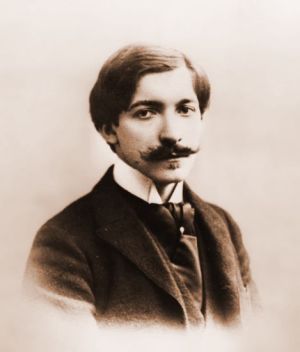One of our staff members is contributing considerably to a News Archiving service at Mu. Any well educated (Masters, PhD or above) users who wish to make comments on news sites, please contact Jim Burton directly rather than using this list, and we can work on maximising view count.
Pierre Louys

Pierre Louÿs (Born 10 December 1870 – Died 4 June 1925), born Pierre Félix Louis, was a French poet and writer, most renowned for lesbian and classical (ancient Greek) themes in some of his writings. He was made first a Chevalier, and then an Officer of the Légion d'honneur, for his contributions to French literature. His most significant works are the erotic novel Aphrodite (1896) and a poetry collection of translated Sapphic, Ancient Greek lesbian poetry, titled Les Chansons de Bilitis or - in English - The Songs of Bilitis (1894).[1] Telling the life story of a fictional character called Bilitis who is said to be a contemporary of the Ancient Greek lesbian icon Sappho, the first lesbian civil and political rights organization in the United States, formed in San Francisco in 1955, called itself Daughters of Bilitis[2] after the character.
Louÿs studied at the École Alsacienne in Paris, and there developed a good friendship with a future Nobel Prize winner and champion of pederasty and homosexual rights, André Gide. During the 1890s, he became a friend of the Irish homosexual dramatist Oscar Wilde, and was the dedicatee of Wilde's 1891 play Salomé in its original (French) edition. Louÿs was thus able to socialize with homosexuals. He started writing his first erotic texts at the age of 18.
Louÿs's Handbook for Little Girls
In 1917, Louÿs wrote the erotic literary work The Manuel de civilité pour les petites filles à l'usage des maisons d'éducation (English: Handbook of behaviour for little girls to be used in educational establishments). It was published anonymously after his death in 1927. Wikipedia describes the book[3]:

It takes the form of a parody of the rigorous educational handbooks of the time, and is thus composed of short pieces of advice (generally a sentence or two) arranged into topics: "At home", "Duties towards your mother", "In class", etc. The tone of the work is sharp, even concise, the style particularly believable and chatty. Pierre Louÿs uses irony readily to evoke the cheap loves of the perverse young girls, and this relative distance enables him to despise any moral censure (incest, pedophilia...). [...] "The Handbook of civility" is undoubtedly the most subversive work of Louÿs, a true attack against the middle-class puritanism of the Belle Époque.
By the way of illustration, the "Glossary" which opens the work comprises this warning:
"We have considered it useless to explain the words: cunt, slit, fanny, mound, cock, tail, bollock, testicle, cum (verb), cum (noun), erection, masturbate, suck, lick, pump, kiss, fellate, screw, fuck, ass-fuck, ejaculate, dildo, lesbian, dyke, sixty-nine, cunnilingus, cute, whore, brothel. These words are familiar to all little girls."
Other quotes include:
- "If you sit on your father's left thigh, do not grind your butt against his cock to make him hard, unless you are both alone."
- "Rest assured of this truth: Everyone around, whatever their age or sex may be, wants to be fellated by you; though the majority would never dare say so."
- "Marvel at the Lord's generosity, for he gives every little girl a pussy to welcome all cocks in the world, and - for variety - Allows the tongue to be used in place of the cock, the finger in place of the tongue, the anus in place of the pussy and the mouth in place of the anus."
See also
- Andre Gide
- Roger Peyrefitte
- Jacques d'Adelsward-Fersen
- Henry de Montherlant
- Jean-Claude Féray
- Alain Robbe-Grillet
- Tony Duvert
- Norman Douglas
- Johann Wolfgang von Goethe
- Thomas Mann